#we need more well-written followers w/ a romance subplot like this
Text
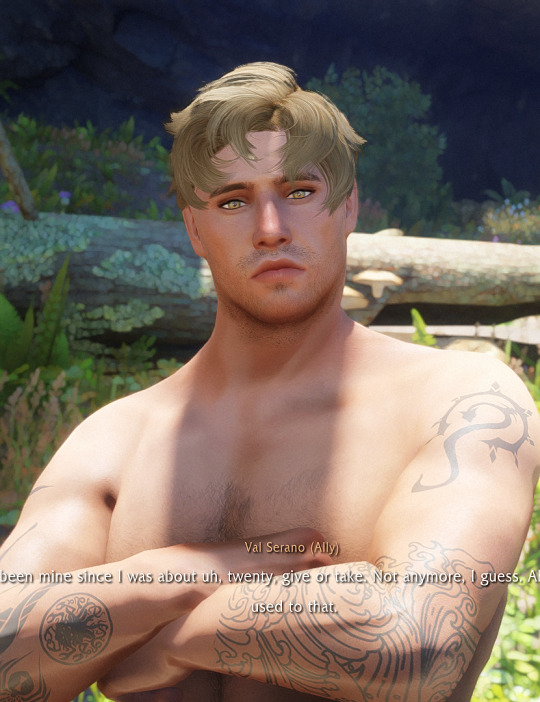
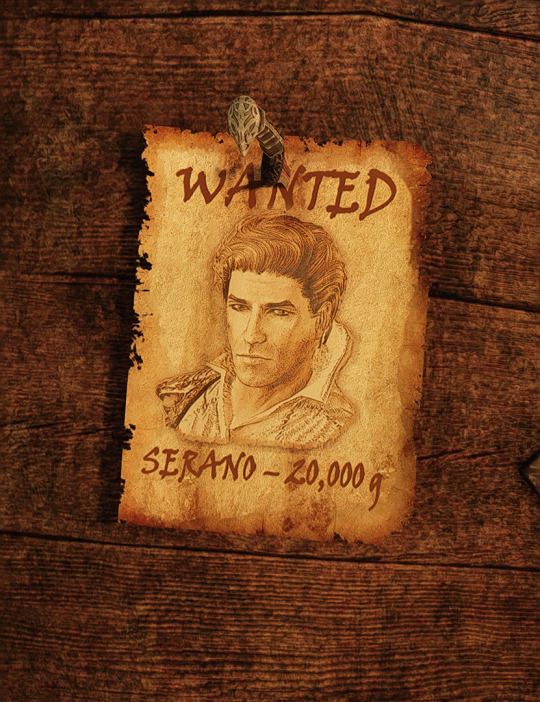
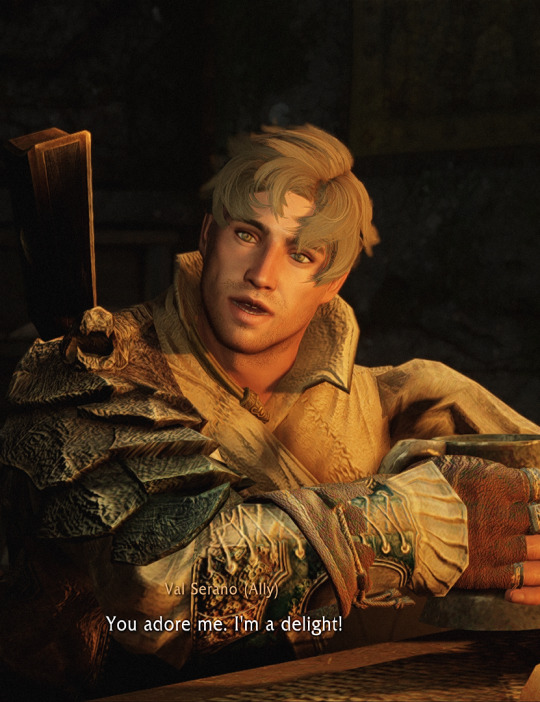

was pleasantly surprised by the quality of the Val Serano follower mod (because who doesn't want to romance a hot pirate am i right)
#tesv#skyrim#skyrim se#val serano#we need more well-written followers w/ a romance subplot like this
30 notes
·
View notes
Text
Why Do Certain Ships Become So Popular? (And Why Should Writers Rethink When They Do?) - Part 2
<- Start back at part 1 or you’re going to be very confused!
This time my victim of choice example is Klance (and Allurance and Lotura too).

In a previous post, I established the premise that shippers focus their efforts and attention on ships between characters who exhibit the most compelling dynamism, the greatest amount of emotional energy--good feelings or bad--that directly relates to one or more of the characters’ growth arcs... or the two characters whose emotional interactions most significantly affect a story’s main plot.
This idea (that shippers are looking for strong, dynamic emotional interactions that are directly tied to plot) feeds directly into my second premise: part of the popularity of slash ships comes from the fact that, very often, the strongest and most plot-relevant emotional events don’t occur between male characters and female characters, but between male protagonists and other male characters--due to a combination of 1) a much smaller number of female characters, 2) a majority of writers for anime/manga and American shows being male; 3) under-developed or poorly written female characters, and 4) the tendency to situate males in the hero, sidekick, and villain positions, increasing the chance that their actions will have greater importance in the story’s main plot.
In short, writers can unintentionally cause fans to prefer non-canon slash ships by writing more dynamic, better developed, and more plot-relevant interactions between their male leads than between the main character and his designated female love interest.
Now hang on. Before you get all up in arms, yes, I’m perfectly aware there are plenty of other reasons slash ships are popular, including:
A huge desire among LGBT+ fans for positive representation
The fact that m/m interactions appeal to straight women/others the same way w/w interactions are sexy to straight men/others
The tendency of shows, particularly from Japan, to deliberately queer-bait
The fact that many women vicariously ship male characters together because it allows them to imagine a relationship of “genuine equals,” particularly in areas where women feel they are still not treated equally to men
The tendency for “pair the spares” to result in m/m ships simply due to a lower number of available female characters
And so on
This isn’t written to negate any of those reasons or to imply that they aren’t major factors in the popularity of slash ships, not at all, but it has always, always struck me as reductive when I hear things like “Slash ships are only popular because girls think two dudes together is hot” (the fetish argument) or “Girls will ship any two good-looking male characters together regardless of canon. They just hate het ships” (the fetish argument with a side dish of misogyny).
In particular, this last one--an argument I’ve heard from a lot of male fandom members (but of course not all)--has always gotten under my skin, because it implies that girls who ship aren’t capable of critically analyzing the media we consume and identifying characters who have meaningful interactions and interesting potential. That we, unlike those viewers who adhere to the canon (typically heterosexual) relationships, are somehow reading these stories wrong, blind to “real” romance (namely the one between the male hero and his best girl/waifu), and/or misusing male characters with zero regard for their personalities--worse, this argument also implies that female fans deliberately hate or under-appreciate oh-so-perfectly written female characters whose romantic subplots are totally natural and not at all an unfortunate side effect of their position as the token chick on the team...
At its best, the statement: “Girls will ship any two good-looking male characters” is demeaning in its dismissal of a majority of slash shippers and their ability to read characters. At its worse, it’s this exact dismissal that continues to allow so many (primarily male) authors to write under-developed, unimportant, token female love interests: “It’s the girls [or the slash shippers] who are weird; there’s nothing wrong with the way we’re doing things.”
But guess what happens when well-written female characters whose actions are central to a story’s main plot are introduced and highlighted? Guess what happens when the emotional energy between a female lead and her male counterpart is the most compelling and dynamic in the series?
The (often canon) het ship suddenly--somehow--magically becomes well-liked by fans!
Zutara and Kataang vastly out-strip any slash Avatar pairings in popularity. Noragami’s Yatori commands a staggering following in the fandom. Is there anyone in their right mind who thinks Alucard/Integra wasn’t the best pairing to end Hellsing with? No one debates whether or not Ahiru and Fakir from Princess Tutu are true love. In Doctor Who, Rose and the Doctor reign so far supreme in the fandom that none of the other ships even need to exist though I actually prefer River. Terra and Aqua from Kingdom Hearts beat out every other Terra or Aqua ship by a mile (and this is in a series notorious for hating and under-shipping its female characters). Gekkan Shoujo Nozaki-Kun has no problem juggling three very well-accepted het ships--even while having a scene in which two male characters sit down and draw a gay manga together. Ain’t nobody suggesting Mr. Bates and Anna from Downton Abbey should be with anyone else, right? And this is just in the handful of shows I personally have time to watch. Anyone who reads or watches a series with well-written female characters can play this exact same game!
The obvious conclusion? Female fans are perfectly willing to ship heterosexual pairings--if they’re well-written.
It’s the same story all over again: when the real emotional energy, the dynamic core, the most plot-relevant interactions occur between a male and female character, they too can become the fan-preferred couple. (Shocking!)
Yes, yes, I hear you saying “B-But wait, sometimes the m/m ship is more popular even though the het love interest is well-written!” or “Sometimes girls ship guy characters who have never even met!” or “So what you’re saying is female fans wouldn’t ship slash if there were better het options available?”
1) Don’t get me wrong--there are certainly always exceptions. I’m pointing out a trend, not a rule. Sometimes a fandom has a separate, specific reason for elevating a non-canon slash ship above a well-written canon het ship. (Someone who is actually in the Fullmetal Alchemist fandom might be able to explain why Ed/Roy is more popular than Roy/Riza, probably?) And in situations where a slash ship and a het ship in a series both have equally strong emotional energy, my bet is that the slash ship will always come out on top because it gets the added benefit of people liking LGBT+ rep and straight girls (and anyone else) who just think m/m is hot.
2) Crack ships definitely do exist. But usually when a crack ship actually manages to become popular, it’s because fans have recognized the potential for a strong emotional energy between two characters. If the two characters could reasonably have strong tension because of similarities, differences, or other elements of their characters, then crack ships are still following the trend of aligning with emotional energy, even if that energy is only anticipated at the moment.
3) I definitely don’t mean to suggest that slash ships are shoddy seconds to fans who would “naturally” prefer het ships if good het ships were available. What I’m suggesting is only that it’s no surprise slash ships are so extremely and consistently popular across so many fandoms, because in terms of plot relevance, depth of writing, and meaningful interactions with each other, male characters so rarely have any real competition. A desire for LGBT+ representation and people living out power or equality fantasies through slash are certainly motivating factors and good and worthy reasons to write slash. But one unfortunate contributor to the popularity of slash ships is that male characters continue to occupy a place of privilege in modern narratives. Our heroes remain overwhelmingly male. Our sidekick/lancer/buddy characters remain overwhelmingly male. Our villain characters remain overwhelmingly male. That is to say: male characters continue to dominate all the most “plot relevant” roles in our narratives, and so long as male leads continue to be placed in roles where their most compelling emotional interactions and greatest sources of character growth are other male characters, slash ships will continue to dominate fandoms’ online presences.
(Hilarious: the dude bros who complain about the number of slash ships in their favorite series are often the very same ones supporting and becoming the writers whose shallow portrayals of female characters further bolster the popularity of said slash ships in the first place...)
Okay, I’ve made you wait long enough.
What does all of this have to do with Voltron?
Well, you’ve probably figured that part out already, actually.
If we consider the “emotional energy” and tension among Voltron’s main characters, there’s absolutely no question who is at the core, where the most plot relevant and meaningful emotional interactions have occurred, where the “heart” of the story is, in essence...
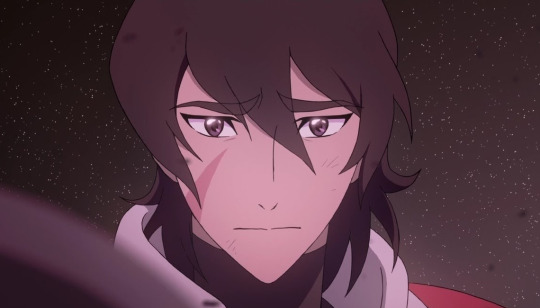
Hint: It’s Keith.
(Just a heads up: I’m going to use Klance as the example because it’s the most popular Voltron pairing according to the numbers, but any Sheith fan worth their salt could obviously very, very easily apply these ideas one-for-one to that ship, because clearly Shiro’s interactions with Keith are some of the most emotionally tense and compelling in the entire Voltron series--they are a consistent core of feeling energy for the show which naturally leads many people to support this ship. A large part of the reason that this post is tagged Sheith is because I am absolutely inviting Sheith shippers to use the theory and lens in this essay to analyze Sheith--using this idea to analyze Sheith will reveal a lot of intense emotional energy to discuss and validate that ship. I’m very tempted to put this paragraph in all caps or something so the Sheith shippers will actually read it and stop badgering me...)
Keith (and his relation with other characters) is the core of Voltron’s main plot, both in that he is positioned as the leader/the hero/the protagonist, and because, obviously, almost all of the series’ emotional high points (with the exception of “Crystal Venom” and Pidge’s search for Matt) somehow feature him.
Keith isn’t just central in the main plot though; he’s also central in the individual arcs of two other characters: Lance and Shiro. He’s a motivating and driving factor in both of these characters’ stories and change throughout the series, affecting their actions, attitudes, and self-worth, and so it should come as absolutely no surprise that Sheith and Klance are the series’ most popular ships.
But since Klance is the most popular pairing, the person I really want to talk about is Lance.
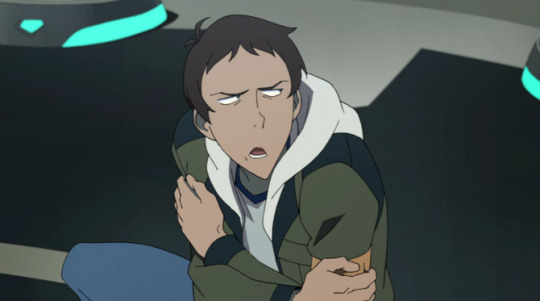
You can say a lot of things about Lance and the raging debates that occurred over whether or not Lance is a straight loverboy trope or not, but I don’t think any viewer of Voltron would deny that, if we consider the main cast members (Team Voltron plus Lotor), the core of Lance’s emotional energy and tension is Keith. His interactions with Keith--not even in a romantic sense, simply in a storytelling sense--are more important and dynamic than his on-screen interactions with any other main character.
From his laser focus on Keith at Garrison that caused him to invent a rivalry (this word is basically just a synonym for “emotional energy” at this point):
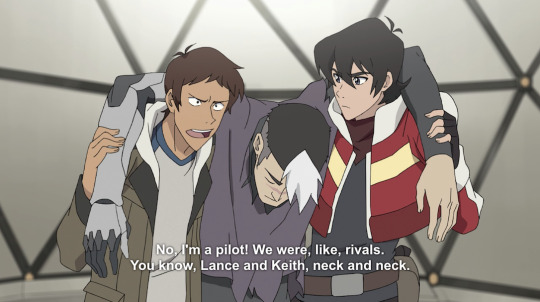
To comedic banter:

To the infamous bonding moment:
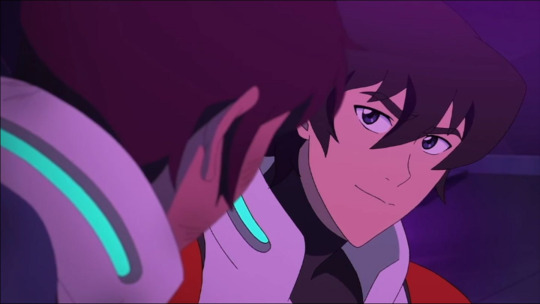
To a fledgling “right hand man” partnership:
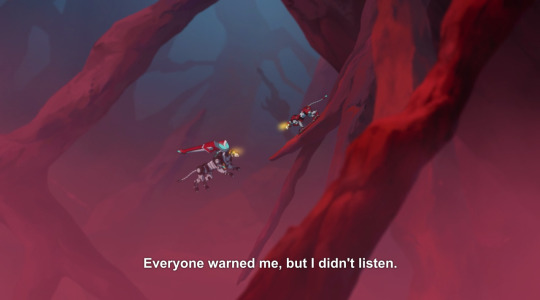
To Lance’s insecurities:

The story of Voltron itself continuously reiterates that Lance’s interactions with Keith are more dynamic, more intense (even if we’re talking about “Rawr, I hate you, we’re rivals!” emotions instead of lovey-dovey stuff), and more plot relevant than Lance’s interactions with other characters in the series. Lance’s emotional arc is irrevocably centered on Keith until very, very late in the series.
More importantly: Lance’s motivation and personal plot line as a whole are centered on Keith. At it’s most basic, Lance’s character arc seems like it was supposed to center on Lance’s sense of self-worth--despite acting confident, Lance was actually insecure about his ability to help save the universe. Theoretically, his narrative should have focused on him becoming confident about his place on the team and his value as both a friend and fellow paladin to the other main characters. His arc should have been (and I guess theoretically still is? It’s just not... ever given much attention?) about him overcoming his insecurity by learning to recognize his own unique talents and discovering the things that only he can do to help Team Voltron succeed. (Hell, the entire Allurance thing could have been framed as “She’s completely out of my league” ---> “Whoa, originally I was putting Allura on a pedestal but actually she’s as much a member of this team as me--we’re in this together, side-by-side.”)
Whether or not the semi-incoherent narrative of Voltron actually delivered on this promise is iffy, but the set up in season 1-3ish is all there and all Keith:
At Garrison, Lance viewed Keith as a road block in his quest to becoming a fighter class student. Keith’s achievements and talent became a measuring stick for Lance’s own capabilities. He imagined a rivalry to make himself feel better/less insecure. His drive not to lose out to Keith is what dragged Hunk and Pidge along to Shiro’s rescue and ultimately led to the discovery of the Blue Lion. Lance comparing himself unfavorably to Keith as a paladin and pilot contributed to (mostly) one-sided animosity throughout the early seasons that gave way to a scene of Lance attempting to step down from the team because he didn’t see himself worthy of the position in comparison to Keith:
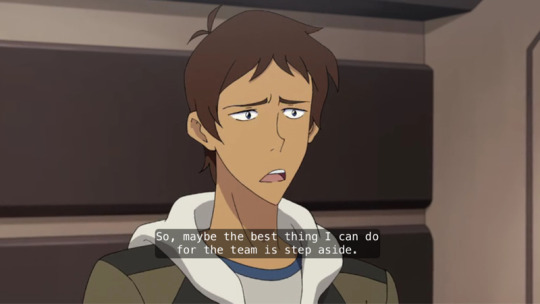
The logical conclusion that I think most fans would draw from these many scenes is that, as part of Lance’s overall character growth across the whole series, he needed to have a moment in which he recognized that he isn’t--and has never been--inferior to Keith.
Ultimately, the first five seasons continually reiterate the idea that, in terms of interactions, energy, and dynamic character growth, the most important main character in Lance’s story (other than Lance) is Keith.
Keith’s interactions with Lance are directly and immediately tied to Lance’s individual character arc/growth, and Keith is definitely the focus of Lance’s most meaningful emotional tension throughout seasons 1-5 at least.
Which means it shouldn’t come as any surprise that Klance is the most popular Lance ship, particularly when you set it side-by-side with the (increasingly canon) Allurance.

I just want to make this abundantly clear before I begin: I have absolutely nothing against Allurance shippers and, until it was done so poorly in season 5-6 (and potentially 7, I still haven’t even finished that one), I actually was okay with the possibility of Allurance being endgame because I thought there was potential for it to be done well. After what we’ve been given, I actually feel the Allurance shippers have been horribly shortchanged by the show’s real writing, and that I can’t personally support the ship the way it’s being written, but that’s not the fault of the characters themselves or anything inherently “wrong” with the ship. So please don’t take the rest of what I say here as ship hate--this is just observations from a literary analysis standpoint.
What has prevented Lance and Allura from gaining significant traction with the fans despite the fact that it’s edging close to canon territory if it isn’t canon already?
Well, one problem might be that Lance’s emotional energy has no bearing on Allura’s individual character development--and Allura’s emotional peaks have no bearing on Lance’s personal arc either (at least as far as it was established in early seasons and then left essentially unresolved).

Allura’s arc has, throughout the course of the show, centered on her ability to defeat her family’s foes, her grief for her lost people and planet, and her desire to follow in her father’s footsteps as a leader and in the Altean traditions as well. None of this has much of anything to do with Lance. Her growth as a character occurs--with the exception of the single shining scene on Naxela--completely independently of Lance. She lets her father’s memory go on her own in “Crystal Venom.” She faces Zarkon head-to-head by herself after rescuing Shiro. It’s Shiro who stops her from over-working herself to aid the coalition, not Lance. It’s Keith’s whose Galra blood forces her to re-examine and overcome some of her universal hatred for the Galra. It’s Lotor who helps her reach Oriande, and her own ingenuity that allows her to tame the White Lion and learn the secrets of Altean alchemy.
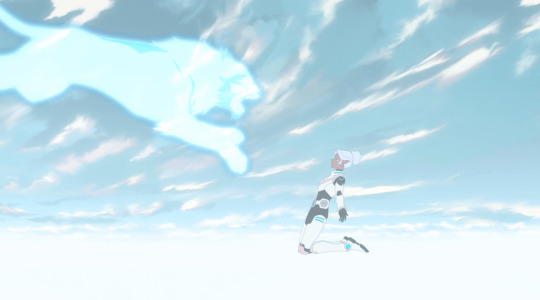
With the exception of the scene on Naxela where it was specifically Lance’s speech that motivated Allura to save the day, virtually all of her most charged emotions occurred elsewhere and with other characters, and there’s nothing in her personal goals--to be a strong leader, to revive her culture, to save the universe--that is intrinsically tied with Lance. He can encourage and aid her in those pursuits, but so can Shiro, Keith, Pidge, Hunk, and Coran. The role of fellow paladin and supporting ally isn’t unique to Lance. His interactions with her don’t fill a niche that drives her personal plot lines outside of the romance subplot.
And the same thing is true in reverse.

We get this nice scene of Allura encouraging Lance and helping him work on his insecurity... And then it is promptly never mentioned again. (Where did the sword go, guys? Where???) Lance gives up Blue to Allura and she’s almost immediately gifted at piloting the Blue Lion, while Lance is shown struggling with Red (once more in Keith’s shadow) and still hadn’t, as of the end of season 6, seemed to have mastered it to the same extent as Keith. It’s Keith, Laika (an alien dog--not Allura guys, an alien dog) and the SPACE MICE that Lance expresses his insecurities to, and it’s Coran who is there for Lance’s touching scene expressing his longing to return to Earth. Lance’s personal arc about growing into the paladin role and becoming a selfless person who puts the team before his own desire for glory once again occurs independently of Allura, with little to no interaction, and even fewer emotional high points between them, in the entire first half of the show.
For both of these characters, their “real emotional energy”--their tension both positive and negative--occurs with other characters. The “believability” and energy of this ship is diminished by the fact that it simply isn’t the most well-written of character pairs in the series. The romance subplot isn’t organically tied to either of their personal plot lines, and the depth of their one-on-one interactions pales in comparison to their, particularly Lance’s, interactions with other characters.
But huh... would you look at that... When a potential romantic interest came along whose interactions with Allura were both directly tied to her personal arc, her central character motivations, and her emotional high points...
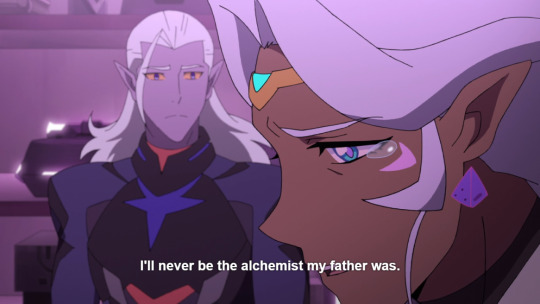
Isn’t it amazing how well it was received by the fandom--despite the fact that no one was really sure whether Lotor was evil or not? Now of course, I’m not going to ignore the fact that Lotura was probably helped along by leaving Keith, Lance, and Shiro free to ship elsewhere, but I don’t think the actual chemistry in the series’ writing itself should be ignored.
There was significantly, significantly more tension and nuance to Allura and Lotor’s interactions that any of Allura’s interactions with any of the other main cast, and their interactions operated not just in a romantic capacity, but also as a vehicle for Allura’s personal character growth:


The push and pull of these two characters and their scenes together sparked change in both of them, which augmented and increased the quality of their romantic arc while also furthering both of their own individual goals as characters.
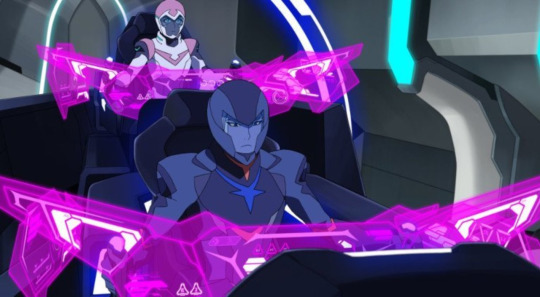
The story painted them as equals with mutual interests, a shared interest in Altean culture, both victims (at least initially) of their parents’ war, both distrusting but ultimately lonely people who were longing for connection to, in Allura’s case, what had been lost, and in Lotor’s case, what he theoretically had never been able to have (except the writers did him dirty so jk).
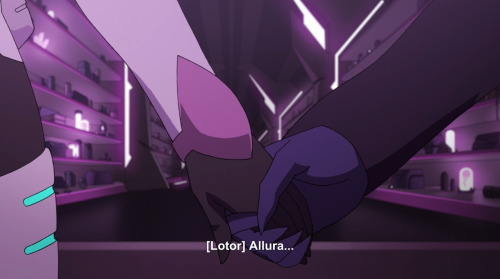
I just don’t think there are many people who would argue that Allurance--or Allura’s interactions with any other male character--have been written with near as much depth, engagement, and integration with her motivations as Lotor and Allura’s were. Their plot literally got more screen time one-on-one in a single seven episode season than Allura and Lance did in the 43+ other episodes...
And for the the short time that it lasted, this pairing was embraced by many fans. I might be biased because I immediately went out and followed every Lotura blog I could find, but to me it seems like it was well-liked and generally well-regarded among shippers until the colony reveal (and by many still after). I was very excited by the writing of this ship and definitely wanted something meaningful to come out of it. Part of the fandom’s immense outrage at Lotor’s reveal was, I think, linked to the fact that this ship had been so convincingly written into the series before it.
This, to me, is a perfect example of a situation in which the emotional exchange between two characters exceeds the strength and depth of their interactions with others, leading to immediate adoption and approval as a ship by the fandom. Where the real energy is, there are the shippers.
PHEW! Let me take a deep breath and come up for air. There’s a lot going on here, but boiling it down to the basic point I’m trying to make, and which I’ll address in a lot more depth in the third and final part of this: the way that a story is written profoundly affects what ships will or will not become popular with fans. Shipping isn’t an unpredictable beast that grows completely independently of its source material. The ways writers craft interactions between their characters--and the places where they invest the most and infuse the most life--are powerful tools that impact how fans view and come to love seeing characters both separately and in romantic relationships.
To that end, while there are numerous reasons slash ships are popular and continue to grow in popularity, one reason that should be considered seriously by all creative writers--fanfiction authors or aspiring original novelists--is the notion that shipping often aligns with the core of a story’s or character’s emotional energy, the pairs with the highest tension, the electric pulse of the story’s most meaningful moments. Non-canon ships of any sexuality swell to mega-popularity when fans perceive more depth and significance in the interactions of characters outside the canon pair, when the emotional work of the story is happening somewhere outside the intentional romantic plot line. Sometimes this is fine. But more often, this is a bad sign for creators--a sign that you’ve fumbled in the writing of your main romantic leads.
As writers, questions we rarely ask ourselves but often should are: “Where is the core of the tension in my story? Whose interactions are deepest and most central to the development of my main character?”
In other words: Where is the real emotional energy in my story?
In part 3 I’m going to provide one more excellent case-in-point, and then close out with a discussion of some take-aways for writers from all this that might help strengthen your romantic subplots, whatever your genre or whoever your characters.
Go on to Part 3 ->
#klance#sheith#allurance#lotura#voltron#voltron meta#voltron legendary defender#slash ships#het ships#writing advice#fanfiction writing advice#shipping#fandom meta#popular ships#writing romance#female characters#writing female characters#my poor ladies#all so mistreated#part two of the nerdiest essay ever written
978 notes
·
View notes
Text
possibilities for pc agency in choice of games romances
long post under the cut about my feelings about romance in games, particularly choice of games (along with stuff like genderflipping characters based on the pc’s gender and sexuality), basically just wanna vent + organize my thoughts on this! [cw for sex mentions + a single assault mention]
i’ve been playing and thinking about a lot of choice of games recently. i’ve always been drawn to them because nearly every one features lgbt characters and romances, but as much fun as i’ve had with the format, as well as the individual settings and characters, that romance aspect that had me so drawn always fell just a little bit flat. a lack of individuality and character in romantic options. they generally weren’t defined, and were customizable to the point of being boring. even now, even when they have their own personalities to some degree, none of the intimate moments between your characters ever feel real or special, because they are either the same across different romance options (choice of the deathless is a sore spot for me lol), or the moments aren’t integrated into the plot and don’t have any sort of emotional basis (i.e. they’re just tacked on)
i remember my first cog that wasn’t just the basic choice of dragons, romance, etc., heroes rise. you only got one love interest, who looked just like a specific celebrity you chose at the beginning of the game. in the next game, you literally choose another love interest’s name for them. of course, genderflipped chars tend to have this issue worse than characters with established genders, not because of that inherently, but because the lack of characterization and high customizability shows even more blatantly. that being said, even non-genderflipped characters can feel cookie cutter and boring after the first playthrough (again....choice of the deathless*)
over the course of the heroes rise series, you do actually get the chance to have romances with established characters, which really intrigued me. i never actually finished those romances (particularly not jury, which REQUIRED you to nonconsensually kiss him to begin the romance, but that’s a whole nother thing), but i remember being really excited realizing you actually could have a relationship with jenny, jury, and prodigal. especially since they felt like they each had their own sexualities, rather than just being bi for convenience, or straight/gay based on your sexuality**
there was something about those romances that felt, to me, much more integrated in the plot. like i was actually having a real romantic subplot in some superhero movie, instead of it just being tacked on and empty the way some of the romances felt***
over time, choice of games have definitely focused more on character development than their predecessors, with a much higher volume of characters with set genders and sexualities. the problem is....it hasn’t been nearly enough
i get that not every game is going to have romance be a big deal. my issue with this is that if you’re going to include romance, it should feel like it’s part of the story, not just some random aside. if writers aren’t going to give as much attention to romance as other parts of their story, why even bother including it? i think cog authors need to start understanding that there doesn’t need to be romance in their games for people to enjoy them, and boring romances don’t do anything for the quality of their stories
i’ve been quietly frustrated about this for a while now, but after playing heart of the house, with its relatively well-developed romances (and surprisingly detailed sex scenes lmao), my issues with how choice of games typically handle romance have become clearer in my head. i’m realizing now that the level with which heart of the house incorporated romance into the story should be the bare minimum that a game that markets itself as having a romance element should. even the one genderflipped character had a fleshed out personality, and good romantic/intimate scenes.
that being said
heart of the house still falls into some of the same traps that virtually all other choice of games do:
1. “pick this one specific flirty option to begin the romance”
this isn’t specific to choice of games, pretty much any game with romance that’s not a dating sim does this. it’s frustrating, because it only really works with certain pc’s personalities. i wanted to romance bastian in heart of the house with a weird occult nerd who doesn’t quite understand social conventions, but finds himself falling for bastian over time. i eventually had to break character if i wanted anything to happen, because apparently in the world of choice of games, characters can only understand love/flirting if it’s in the form of a saucy pickup line, which again, works for some characters (like the one i romanced dev with in another playthrough), but not for others.
the solution: give players multiple ways of starting a romance that can suit a variety of personality types. allow multiple ways to flirt, allow ways to subtly indicate your interest to your prospective love interest for people who wanna make shy, passive characters, and give multiple points at which a romance can start throughout the story so that people can experience their characters gradually falling in love instead of having to miss out on their chance to romance a character because they didn’t imply they wanted to fuck within the first five minutes of meeting them
2. linear romance
despite giving you a bunch of other personality stats and traits for every other part of the game, romances generally tend to play out in the same linear ways across playthroughs. somehow all these things affect every other part of the story....except for romantic + intimate scenes. it really breaks me out any immersion, especially when my character has to act out of character to even access any romances in the first place.
the solution: give players more agency during romantic + intimate scenes. let them take the lead, or allow the love interest to. let them direct the flow of the scene, just like any other non-romantic scene in the game.
3. genderflipping and perspective
genderflipping is controversial among the cog player base, with the majority of people relaying a single criticism of it: accusing the author of writing a character as a specific gender (male or female), and then just switching pronouns. another related complaint, is that of authors writing love interests for specific genders of pc (for instance, the way the sex scene with dev is written makes me think it was primarily written for a female pc, particularly with the way your male pc’s sexual preferences are basically decided for him). it’s true that many games do give off this vibe. however, many of the complaints strike me as strangely essentialist, as if a character should have a completely different personality if they’re male than if they were female, it’s true, gender has a huge impact on people, but this essentialism denies the reality that we are all human, we are all suggestible and influenced by our environments (which imo, largely account for gender differences in personality trends), and there is no one personality trait that every woman has that every man does not, and vice versa. i think we can criticize heteronormativity, homophobia, and misogyny without reifying the concept that men and women are intrinsically different on an emotional and personal level. imo, this very essentialism, where characters whose genders are variable across playthroughs (both love interests and the pc) are written from a specific gendered perspective, is what causes people to be alienated during romances, one way or another
the solution: again, this is where player agency comes in. allowing players to define their own narrative based on their own idea of their character will help players feel connected to their character. additionally, having a strong idea of what a character is like is key. rather than defaulting to heteronormative assumptions of how romance and sex must play out for male love interests vs. female love interests, take a minute to actually think through the personality of your character and what their preferences would be like. this is what i loved about bastian in heart of the house, because though he was a genderflipped character, what he was doing in the sex scene felt very in line with who he was, regardless of gender. meanwhile, dev’s sex scene was...well-written, but didn’t really speak much to dev’s character, in my opinion. in some ways, it almost felt out of character, and it was certainly very ooc for my pc, who was an outgoing flirt who liked to take charge. if you have a strong handle on what kind of person your characters are, they’ll seem genuine regardless of anything else.
4. integrating romance with the story
oftentimes, you can tell right away when a romance scene is going to be happening in a cog. the story suddenly gets diverted from w/e you’ve been focusing on until now, onto either some circumstance that has very little plot relevance, but is contrived to bring you and another character together, or a circumstance that does have plot relevance, usually with a brief diversion focusing on your chosen romance, followed up by the consummation of your relationship shortly after. even when you’re romancing a major character, during plot-important scenes, their dialogue with you often does not change, regardless of the level of relationship they have with you (enemies, friends, lovers, etc., it’s often all the same). the fact that you’re in a relationship with any given person generally doesn’t affect the overarching plot (except for choice of romance, ofc), and romances often feel tacked on for extra flavor. i don’t think i’ve seen a game that combines all these issues in one (except like....choice of the dragon but i dont think that counts lol), but most games have at least one element of this. in heart of the house, the first and only intimate/sex scene you have with your love interest always happens during the ball, and at no other time. in dinoknights, you may as well not have had a romance at all, except during a few brief asides.
the solution: this one is more complicated than the others, but even if you don’t want the player’s relationships to directly affect the main story, romantic + intimate scenes often feel much more integrated when they aren’t mainly segregated to defined “romance portions” of the game. a better way of approaching it is letting the story happen as it will, making sure love interests are interesting, well-defined, and relevant to the story, and considering how a romance might affect events as they play out. in my own game concept, there is a choice you can make that determines whether a certain character lives or dies. if that character lives, the aftermath of the danger that threatened them results in a vulnerable moment for them, and is the first point at which you can start a romance with them. this event would happen in the story regardless, but the way it proceeds would change based on your relationship with and reaction to them and the event, making a pivotal part of the story a similarly pivotal part of the development of your relationship.
i don’t know if this is all i want to say on the subject, but i wanted to get my thoughts out and down, for reference and also to help me think through the subject
congrats if you managed to read and stay interested in all of this lol
*ironically, the genderflipped character in deathless was the most interesting romance, iirc
**i don’t actually think this is inherently a bad thing, but having characters with a variety of sexualities makes every other character’s sexuality feel more fleshed out, imo
***that being said.....i really did love lucky when the hero project first came out djshkjhs
****i’m referring to bastian with he pronouns, because that’s what he was in my playthroughs, and i don’t actually know what the female version of his character is named
1 note
·
View note
Note
The whole "And If the Grave Be Now Thy Bed" counts as a chapter or scene, right? "Splendid news, Mrs. Mears. Bloody Vengeance Inc. is going to take your case." Commentary, please :)))
For reference: https://archiveofourown.org/works/478957
Ok, this one is too long to do a blow-by-blow in a Tumblr post, so I'm gonna talk about it more generally.
For those of you who haven't read the series this story is a part of, it's a long-running AU which branches off of canon after "The Gift." I started writing the first story in it immediately after "The Gift" aired, so Spuffy wasn't even a canon thing yet. At the time, I was pretty certain that Spuffy would never be a canon thing; at most, I thought, there would be a lot of pining and UST, and maybe, in the very last season, Spike would get the crumb he was hoping for.
But I didn't care about that; something doesn't have to be canon for me to ship the hell out of it. And I was fascinated by the concept of an evil demon trying to be good. What would it look like, I wondered, if Spike and Buffy did get together in a working, functional relationship? What changes and compromises would both of them have to make? How would it meet both their needs? What would the pain points be? Of course, the easiest way to do it would be to slap a soul into Spike, but I felt that the show had already thoroughly explored that avenue with Angel, and I wanted to do something different. Plus I have never been one to do things the easy way, and one of the recurring themes in my writing in general is free will and choices. So I set myself the challenge of writing a story about how Buffy and Spike forge a relationship that works for both of them, and doesn't cheat on characterization – that is, Spike, having no human soul, is still "evil" in Buffyverse terms, and his motivations and behavior reflect that; even when he is doing good things, he is not doing them in the same way, or for the same reasons, as a human would. *
ANYWAY. In this AU, Warren Mears and Co. still killed Katrina, but Warren went to jail for it. However, when his inventions came to the attention of Wolfram & Hart, they got him released on a technicality, and brought him into their R&D department. Warren took the opportunity to get his revenge on Buffy and Spike by zapping Buffy into a W&H pocket dimension, where W&H was collecting Buffys from many dimensions for nefarious purposes. Unbeknownst to Warren, Buffy has just discovered that she's pregnant.
This scenario generated four stories: "The Lesser of Two Evils," which details what happens when Willow and Spike confront Warren and try to force him to bring Buffy back; "In A Yellow Wood," which is about Buffy's adventures in the pocket dimension, "If the Grave Be Now Thy Bed," which deals with the fallout of the first two stories, and "To Grandmother's House," which wraps up the arc with Buffy's final decision about the fate of her baby.
I wrote these stories all out of order: "To Grandmother's House" first, "The Lesser of Two Evils" second, "In A Yellow Wood" third, and "If the Grave Be Now Thy Bed" last. I knew the general course of the arc all along, but writing it inside out and backwards, over ten years or more, posed some interesting challenges. "If the Grave Be Now Thy Bed" was not part of the original arc plan – in fact, it grew out of feedback I got for "The Lesser of Two Evils."
TLOTE/IAYW are deliberately morally ambiguous stories. Spike, Willow, and Buffy all do questionable things – perhaps flat out wrong things – under severe emotional stress, and the consequences of those actions echo for a long time through the years to come. While I hope that readers find their motives understandable, and even sympathetic, I didn't necessarily expect that every reader would agree with or approve of their actions. Most people who've sent me feedback seem to enjoy the ambiguity, or at least find it intriguing. Not all of them, however.
One particular reader had...issues. Over the course of several conversations, I found out that while they were a Spuffy shipper, they had very particular requirements for the kind of Spuffy stories they liked. They had to be either A) totally canon-compliant, angst-ridden stories where Buffy hated herself for giving in to Spike's sinister attraction, or B) stories where Spike was a Romance Novel Bad Boy With a Heart of Gold, and there was a tacit agreement between writer and reader that hey, we both know this is totally OOC for both characters, but we're just here for the porn, amirite nudge-nudge wink-wink.
Reader In Question had started in on my work with the assumption that it fell into the latter category, but the more they read, the less comfortable they got, because, as I mentioned above, I was in this for serious. I sweat blood over characterization. And I was starting to convince them that maybe a relationship between Buffy and soulless Spike COULD work. And they didn't WANT to believe that. So they absolutely had to interpret my work as a dystopian take on Buffy's slide into total moral decay, with this particular arc as the nadir of her fall.** They left me some despondent feedback on TLOTE, wondering what Warren's dear mother would think of this turn of events. I'm not sure if they intended to shame me (or Buffy) for our evil ways, but I thought it was an interesting point. And it planted the seed of an idea.
Over the next several years, as I worked on IAYW (and let me say right here, the less-than-enthusiastic feedback Reader In Question sent me on TLOTE made me work my ass off on IAYW. Though I obviously don't agree with their overall interpretation, I thought they had some good points, and I wanted to be sure that IAYW addressed those points) I mulled over the thought: What WOULD happen if Warren's dear old mother confronted Buffy and Spike?
A lot would depend upon what Warren's dear old mother was like. There were two obvious ways I could go with that: she could be an innocent victim, or she could be as much of a monster as Warren was. But I didn't want to do anything obvious with this story. Fic-wise, I always like to take the road less traveled if I can, but in this case, I have to admit that I got a perverse pleasure out of taking Reader In Question's finger-wagging admonition and using it as inspiration for a story that's, well, not exactly what I imagine they were hoping to inspire. I decided that I was going to make Mrs. Mears a little of both.
The next question was, what did I want to have happen when she shows up?Again, the obvious thing would be to have Buffy feel guilty. But I had already dealt extensively with Buffy's feelings, and her reasons for making the decisions she made, in IAYW and TGH. Yes, she feels guilty; she's not sure she did the right thing. She's not even sure there was a right thing to do. But that particular subplot plays out over the long term in this AU, culminating many years later in a completely different story arc, and I couldn't bring it to a premature resolution here. Besides, I knew that Barbverse Buffy would never return to the uncompromising system of morality that Reader In Question wanted her to,*** so there was no point in writing a story where she Learns Her Lesson, Dusts Spike, and Is Very Sorry. ****
So I decided that this story would focus on Spike, and his reaction to Warren's mother and her loss of a son. And that opened up a lot of possibilities. I was to some extent constrained by the fact that I'd already written quite a lot of stories taking place after this one in the timeline, so there were certain things I couldn't do. But I've always found that if you ask yourself, "What would X logically do in this situation?" and follow that through, you can avoid Idiot Plot Syndrome. Let your characters be smart. What would Spike do, confronted with the mother of the man he'd killed? What would Mrs. Mears demand of him in recompense?
What I wanted to do in this story was to answer those questions in a way that people wouldn't expect. I was able to bring Spike's ambivalent feelings about his own mother into play, and provide a way for him to get some character development around coming to terms with her death and his part in it that I might not otherwise have been able to do. And I was able to draw parallels between Warren and his mother, and Spike and Anne Pratt, and come up with some really intriguing takes on how and why Spike can do the right(ish) thing even when his reasons are kinda-sorta wrong(ish). It gives some background, hopefully, on how Buffy can make the ultimate decision she does in "To Grandmother's House," and not feel that she's tobogganing head-first down the slippery slope of Utter Moral Decay. And I got to write Zombie Warren, who was gruesomely, deliciously horrible. And I got to give Mrs. Mears the last word.
By the time I finished the story, Reader In Question had long since left fandom, and they probably wouldn't have read it even if they were still around. But I feel I have to thank them for it anyway. And that's why I always say that even though I don't necessarily like getting critical feedback, it can be the most useful feedback you can get if you look at it in the right way.
__________
* I could write a whole nother essay about the challenges of writing an evil-trying-to-be-good vampire, but that is beyond the scope of the current post.
** Eventually, they practically begged me to tell them that I was deliberately writing Buffy and Spike out of character, and that I didn't really think a relationship between them could work. Alas, I could not oblige them, and they stopped reading my stuff.
*** I don't even believe canon Buffy stuck to that kind of rigid moral code – she tried to, but one of the things that makes her a complex, fully realized character is that canon Buffy is perfectly capable of double standards and hypocrisy where her friends are concerned, not to mention just plain changing her mind about things over the course of the show. For every decision I have Barbverse Buffy [or Spike, for that matter] make, I can point to something in canon and say "This is why I think she could do that."
****Although... I do have an alternate ending to "To Grandmother's House" plotted out in my head, where Buffy [either accidentally or on purpose – just as in the main story, it's ambiguous] doesn't stop Giles in time. I consider the Barbverse to be a low-probability AU, and I watch out for times and ways in which things could go spectacularly wrong, just so I can be sure to avoid them in a believable manner. Or write stories about them going wrong, and the characters dealing with them.
*****
15 notes
·
View notes
Text
Analysis of an analysis
The main plot of The Room is very simple and God I wish I lived in the universe in which it weren’t, just to see, what it would’ve been like if the director were allowed to go fucking ham on the script. It reads like something I’d have written when I was like 9, only to go back and remove the more blatantly unrealistic elements (pirates) and insert in a lot of what my 9 year old idea of Adult Drama would be.
Jesus fucking Christ okay gimme an exacto knife and I’ll slice these boxes there is already way too much to unpack.
Why am I drawn to convolution? Why does it matter to me if the director had total creative freedom? Why would my nine year old self write a misogynistic story about betrayal culminating in a suicide and why would that be my nine year old idea of adult drama? Why did I specify I liked pirates when I was nine? Does that matter?
It’s about a woman (Lisa) who cheats on her fiance (Johnny) with his best friend (Mark), because she’s fallen out of love with him, and the inaction of everyone involved as well as the transgression itself drives Johnny to commit suicide.
Did Tommy Wiseau intend for everyone else to betray Johnny through their inaction, or was that just my understanding of it at the time? I rewatched the film yesterday and actually, a LOT of characters try their best to mitigate the damage and stop it in its tracks. So why did I say they were inactive?
I kinda wanna make a shittily edited montage with scenes of Mark and Johnny to Even In Death or My Immortal or something like that by Amy Lee but I don’t know how to edit video, so that’s out, for now.
Why do I want to do this? It’s not a competent film, but why do I want to mock it? Also, I like Amy Lee, so why do I want to mock it through that specific medium? And why do I want to focus it on Mark and Johnny? What’s the relevance of that? Why did I choose those two songs specifically as well? Both of which focus on grieving and being haunted by the memory of a dead loved one.
There are a few unresolved subplots as well which I’ll get to later.
The film introduces the two main characters, Johnny and Lisa, by Johnny giving Lisa a red dress as a gift. If a man got me a sexy red dress as a gift I’d kill him. Fucking dresses and flowers and petals he’s just PERFORMING romance. He performs EVERYTHING with symbolic shorthand “oh, how do people act, men play catch I think? Eeeerrrrr then I will have my men play catch. In SUITS. Yeah this is humanity I fuckin’ nailed it.”
Why do I feel the need to specify that I wouldn’t appreciate a sexy red dress from a man as a gift? It makes sense for a man to gift his fiance a sexy red dress. There’s nothing intrinsically wrong with that. Why did I specify that I wouldn’t appreciate it, when my personal distaste has nothing to do with it. Nobody reading this needs to know. I don’t need to tell them that.
Why so critical about Johnny’s performance of human concepts like male friendship and romance? Why did I mock it? What is wrong about it?
There’s a running thread throughout this movie, wherein Johnny’s primary mode of affection is incredibly materialistic, and his friends value him primarily for what he can do for them on a financial/material scale. #Crapitalism. Similarly Lisa is only ever valued by other people for her external appearance cuz all the men are thotty creeps.
Is this assertion even accurate? Johnny provides emotional support to his friends throughout the movie. It might be more accurate to say that Johnny values *himself* for what he can provide. But this isn’t about that. Why did I discard his emotional support? Why did I assert that his affection is materialistic only? Why did I say his friends only value him based on that?
I don’t think I’m wrong about what Lisa is valued for. But why did I pick up on that in the first place?
Blaa blaa fucking blaa dichotomy between realism crossing into surrealism Tommy Wiseau’s a misogynist and I can and will fucking make Lisa an interesting character blaa blaa fucking blaa nobody’s going to read this fuck you.
Why did I mock my own analysis in this paragraph and only very disparagingly allude to the realism -> surrealism? Is it because it’s kind of fucking pretentious? It IS. But why do I give a shit. And why do I simply just not shut the fuck up and not say it at all? Why do I say it? Am I trying to communicate I know it’s inherently kind of ridiculous? Why? For who? What am I hoping to maintain?
Why did I gravitate so strongly to Lisa’s defense despite knowing she has very few, if ANY, redeeming personality traits. I know if she were a real person I wouldn’t like her. Why do I feel the need to impose depth on a character that wasn’t intended to have any? Defiance in response to the inherently misogynic portrayal of women? Why do I feel the need to defy Tommy Wiseau’s original intentions? What am I expecting to accomplish?
If I posit that I have no audience, who is this for? And WHY do I posit that I have no audience? Why is that important? What purpose does pointing it out serve?
Lisa is the surreal element- every other character is pretty fuckin’ preoccupied in their social status and place in their society and maintaining it, bitch gets what she wants she ain’t about that conformity. I mean she’s also an adulterer but fucking hell I have to impose depth art is interpretive blaa blaa fucking blaa why did I delete my blog I don’t remember anyone’s URL LMAO.
Here I equate surrealism with anti-conformity. Which is kind of strange, because it implies that I think conforming to society, accepting your social status, and maintaining it is realistic. The tone of this paragraph when talking about Lisa’s “surrealism” is pretty positive toward her. Which would also imply that I think realism is bad.
Why do I HAVE to impose depth and my own ideas onto Lisa specifically? Why do I keep justifying myself with “art is interpretive”?
I then proceed to dip the fuck out and mock my impulsiveness as if trying to remind an audience (that I supposedly do not have) that I’m self aware of my own pretentious and inherently kind of stupid shortcomings. But if there’s no audience, as I said earlier, who is that directed toward?
Anyway I guess there’s something to be said for Johnny destroying all his possessions at the climax of the movie. Once he loses his trophy woman to his best friend he has nothing left, does he? He really has nothing going for him. I mean he has his job still but when he loses his already pretty flimsy social life all he has left are his materialistic possessions and they can’t exactly do therapy at him. But his entire life is his job and what he can possess. Destroying the only things he has left is self destruction. SHE TORE HIM APART.
Why would I claim that he has nothing but his material possessions left? I don’t think this is supported by the movie. He has his other friends. He has Denny. I’m contradicting the source material to impose a certain idea onto Johnny. Why?
Why did I reference a line in the movie to mock his act of self destruction?
Ripping Lisa’s red dress at the end is a symbolic murder– because I don’t believe he ever saw Lisa as her own person. He saw her as another thing he could possess. A symbol of status he could dress up. A material. Lisa may as well have been a bit of red fabric. After all the momentum of the film often halts just to have characters comment on her hotness. Supporting this statement is the fact that, although she was lying about physical abuse, he does get pretty physical with her soon after. Foreshadowing? Fuck if I know, this movie wasn’t made competently. Was I written competently? Am I going to spiral before I die? Questions questions! All of them edgy!
I don’t know that I’m correct when I say that Lisa was his trophy, and a status symbol. He killed himself over her unfaithfulness. He stated a few times that she was clever. So why do I assert that she’s no different than any other possession he had?
Does the momentum of the film REALLY come to a halt to have characters remark on her appearance? Why do I take notice of that? Why is it important to me to say that?
I support that the tearing of the red dress is symbolic of murder by stating that Lisa’s lies about being physically abused are foreshadowing of that event. Maybe that’s a stretch in the context of the FILM, but I’ve also asserted that joking about having a heart attack was foreshadowing for my heart attack, so even though it’s a stretch when you apply that to the FILM, it’s not a stretch when you apply that to REALITY. Why is foreshadowing important to me in that way?
I immediately state I don’t know, and that the movie wasn’t made competently, but we all knew it wasn’t. I immediately focus back on real life implications. Was my attempt at comprehending the narrative of The Room an attempt to comprehend the narrative of real life? If so, why did I pick THE ROOM, of all movies? If you’re self deprecating on a blog with no followers and nobody reads your post, does it make a meaning?
I wonder if there are any shitty fanfics written about Tommy Wiseau on wattpad. I’m not looking. But I fucking wonder.
Why the change in topic? Why wattpad, a fiction site known for mostly hosting kids fictions? Why am I drawn to haphazardly made fiction?
Nevermind I looked and there’s “Trapped On An Island With Tommy Wiseau”. Fucking. Glorious. Why didn’t I pick THAT to over analyse? Holy fucking shit it’s amazing. I want to know where THAT story is going.
Whatever.
Why did I change my mind and look? I immediately contradict myself. Why DIDN’T I analyse that fiction over this one? Why did I like it so much? Why did I want to know where that was going? Why “whatever”? Is not saying something just as important as saying it? Bring up an idea only to dismiss it immediately after.
So anyway, people repeat themselves when they talk sometimes, and they do it in the movie as well. That’s cool. That’s good. That adds some naturalism to it. That makes it seem like real people talking and not actors. Yeah.
The tone of this paragraph is different to all the other paragraphs. Why? What was I thinking?
EXCEPT IT DIVES ASS OVER TEAKETTLE INTO SURREALISM! When those people repeat themselves in ways that don’t make sense as a shorthand way to progress the scene. It’s just a single step removed from [INSERT SOMETHING TO CHANGE THE SCENE HERE]. “I don’t want to talk about it.”
What’s the purpose of pointing this out? I remember saying this and wondering if I’ve ever heard or said any artificial, fake sounding excuses to progress a plot or scene. Why did I pick “I don’t want to talk about it” as my cited quote over all the other choices? Do I just not want to talk about it anymore? If I didn’t- I wouldn’t. Does the AUTHOR not want me to talk about it? That is after all the same reason Lisa reuses that quote over and over. She wouldn’t bring it up if she didn’t want to. Tommy Wiseau is the one who wants her to stop talking about it. Why can I not focus too hard on this?
It’s something isn’t it. Damn. Yep. I’m chewing gum with the paper still on it just to see what happens. Hope it’s not poisoooooooon.
I unceremoniously change the subject to totally irrelevant bullshit, highlighting my own stupidity, as if to remind somebody of it. What audience? Then the subject of poison. Why?
Aw hell I had to talk about the subplots. Iuno. INSERT SUBPLOT BLATHERING HERE. Danny took drugs. That was something. Amazingly the movie treats drugs and alcohol as bigger sins than attempted murder and assault! The characters do! Everyone does! Fucking glorious. IT’S NOT WHAT THE ILLICIT SUBSTANCES MAKE YOU DO UNDER THE INFLUENCE, IT’S THAT YA TOOK EM AT ALL! I forget what it means.
I hastily talk about the subplots, only really focusing on the alcohol and drugs/attempted murder and assault, for the purpose of mocking the condemnation of both over murder/domestic abuse. Why so hastily and haphazard, though? “I forget what it means” but I still bring it up? Why?
YOU ARE TEARING ME APART, NOCTURNE-DOLCE!!!
Why this joke? Is there significance to putting Nocturne in the role of Lisa? The placement of this joke is odd, too. Why here? Why now? Why out of nowhere? What am I mocking? Why am I mocking it? It’s a total non-sequitur.
Yeah. I wonder if I could construct a shitty emo poem using only lines of dialogue from The Room.
Why?
Don’t leave
I need you, I love you
Everything is going wrong
You don’t want to talk to me
They trick me
They didn’t keep their promise
They betray me, and I don’t care anymore
You are TEARING ME APART
I don’t care
Everything is not okay
Don’t worry about it
It’s definitely shitty.
Why did I pick these specific lines of dialogue? Why did I do this at all? Who benefits from it? What’s it even saying?
The more I think on it the more I realize that Lisa is literally the only character that develops as the movie goes on. I mean her development is basically “HOT ADULTERER IS EVIL WOMAN BITCH” but, yknow, at least she’s not like poor dumb Mark who has sex with her countless times and still manages to be stunned when she proposistions him for sex.
Why did I pick up on this? What significance does it have?
Arguably she’s also the only character that shows any kind of agency; all the other characters seem to have their patterns. Mark asks her “why are you doing this to me” as if he’s a totally passive, blameless bystander, each scene with Claudette is exactly the same as the last, etc. The only character that really advances the plot is Lisa.
Are there blameless bystanders in our reality? Who have no agency? Are we some of them? Are we Lisa, or are we Mark? Is agency indicative of immorality in the context of this movie and our lives?
Lisa: agent of chaos and change. I unironically adore the PISS out of her dialogue. Check it the fuck out:
If so what does my admiration say about me? She is unquestionably the villain of the film? Why do I choose her as the favorite?
You know, I really loved Johnny at first. Everything’s changed. I need more from life than what Johnny can give me. Suddenly my eyes are wide open and I can see everything so clearly. I want it all.
If he can’t give me what I want, somebody else will.
You have to take as much as you can. You have to live, live, live.
I don’t see what the big deal is. Doesn’t everybody look out for number one? Don’t I deserve the best?
There is no baby. I told him that to make it interesting. We’re probably going to have a baby eventually anyway.
I am not responsible for Johnny. I’m through with that. I’m changing. I have the right, don’t I? People are changing all the time. I have to think about my future. What’s it to you?
Do I identify with Lisa? If so, why? Is it because she’s supposed to be representative of all woman and I’m compelled to argue against the really sexist idea of that while still obeying the framework of the movie? Or is it foreshadowing of future villainy? Foreshadowing is after all significant? Is my pursuit of personal agency evil?
Hot take: Lisa and Lola are the same character except one is a fish from Shark Tale and the other is Lisa from The Room.
This is ominous.
0 notes